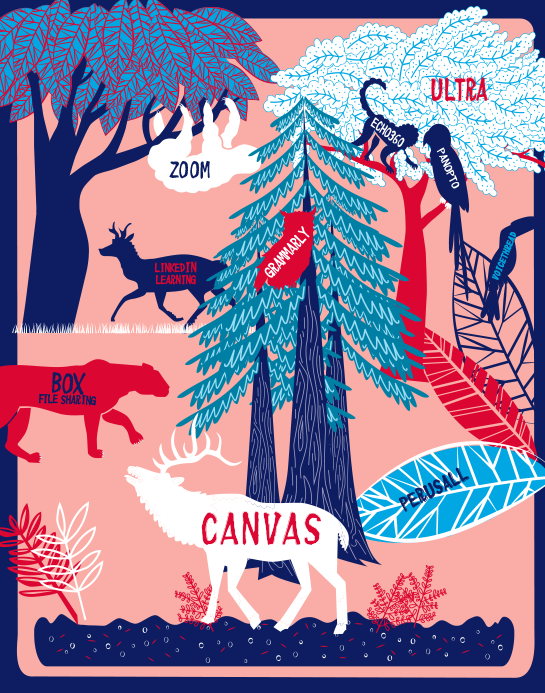Year One Results of Our Multi-Year Application Review
quote
As our university continues to evolve, so do the applications we use and the needs of our community. Adapting to these changes is crucial in ensuring that everyone has the tools and resources they need to succeed.
text

Last August, I published an article discussing our approach to academic applications and our plan to update our teaching and learning application ecosystem, titled Introducing the Multi-Year Review of Our Teaching and Learning Ecosystem of Applications. This report follows up on that article, sharing the outcomes of the data we have collected, the applications we will be retiring, the projects we are currently working on, and what to look forward to in the future.
Changes in Our Application Ecosystem
As announced throughout the year, we will be retiring VoiceThread. With an annual cost of around $31,000 and under 5,000 users, supporting this application at a university-wide level no longer makes sense. Applications like Panopto can perform many of the functions that VoiceThread offers. As we explore new opportunities within our Learning Management System (LMS), we are witnessing increased interest in interactive video overall. Additionally, we face accessibility issues with this application, as all applications in use by the spring of 2026 must be WCAG 2.1 compliant or have an approved exception.
When we retire an application, it allows us to use those funds to introduce a new one. Starting late this spring, we will pilot Perusall for the second time. Perusall is a social annotation application that enables instructors to upload articles of various types or purchase textbooks, allowing students to annotate, interact, take quizzes, or share notes within the content they are reading. In 2023, we piloted both Perusall and Hypothesis, but split usage left us inconclusive data on which application to adopt. Currently, we have 1,300 students using Perusall in courses, making it a fitting time to pilot this application again. Like Grammarly, we aim to pilot this application for at least a year or longer, offering guides and workshops around its usage, with the potential for university-wide adoption if the data supports it.
Grammarly: Year Two of the Pilot
We are excited to announce that we are several months into year two of our Grammarly pilot. We will continue to survey faculty, staff, and students; currently, interest in university-wide adoption stands at 88%. Some exciting changes are happening with Grammarly during this second year. First, we have enabled the Grammarly Editor, which allows the university to save papers in the Grammarly Cloud and edit them there. This feature was the most requested addition from our student surveys. Second, Grammarly is now compliant with FERPA and HIPAA, making it available for use by the Health Sciences, Medical School, and the hospital. Finally, Grammarly is working hard to better customize our version to address some of the criticisms it has received. If you have any additional thoughts or questions, please contact LTS!
LMS Testing and Transition
As most of you know, we have completed an evaluation of our Learning Management System (LMS) to identify the modern LMS that best supports UIC’s academic culture and student needs while providing the most user-friendly experience for everyone. With a formal announcement pending from the provost, we will also be looking at new applications that take advantage of a new LMS platform to add unique and innovative functionality. More to come this fall!
Although a final decision is still pending, our survey results point to Canvas being the campus favorite. Whether UIC moves to Ultra or Canvas, though, we will continue testing innovative tools to streamline and enhance our faculty’s tremendous work.
Inquiry on Echo and Panopto
Additionally, we have initiated an inquiry into determining the best video content management system and lecture capture system for our university. Currently, we use Zoom, Panopto, and Echo 360 for these purposes. Zoom will continue to play an integral role in our ecosystem, being essential for events, meetings, and our phone system. We are assessing the capabilities, future roadmaps, security, accessibility, required equipment, and other factors of both Echo and Panopto to identify which application best meets our university’s needs. Supporting two of these systems is inefficient and costly, and a crucial factor will be Title II compliance (accessibility), ensuring we provide videos that support accurate captioning, audio descriptions, and text-to-voice capabilities.
Fostering Community and Innovation in Our University
As our university continues to evolve, so do the applications we use and the needs of our community. Adapting to these changes is crucial in ensuring that everyone has the tools and resources they need to succeed. We recognize that each group within our community has unique perspectives and requirements, and we value your input in shaping the direction we take. By actively involving you in the decision-making process, we can create a more inclusive environment that fosters collaboration and innovation. Together, we can identify challenges and opportunities, ensuring that our university remains at the forefront of educational excellence. As we move forward, we continue to be committed to being transparent and communicative, and we appreciate your support as we work together to enhance our university experience for everyone involved.